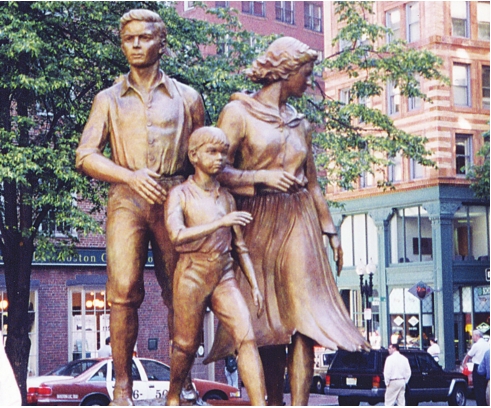
Boston's Irish Famine Memorial.Corned beef and cabbage is a popular meal on St. Patrick’s Day, but it did not originate in Ireland.
It was not until 1 million Irish fled their homeland for America during the Great Famine of the 1840s that the cheap cut of meat was integrated into the new immigrants’ diet, according to Sean Grant, former executive director of the Irish Cultural Centre of New England.
The
traditional Irish boiled dinner consists of pork, known as “back bacon”
or “rashers,” potatoes and cabbage, carrots or parsnips.
However,
pork and lamb, other prominent meats on the island, were often hard or
impossible for the impoverished working people of Ireland to afford, so
they usually ate only vegetables and starches, Grant said.
When
the new immigrants arrived in America, they found that corned beef, an
inexpensive meat that was easily acquired, could be boiled with potatoes
and cabbage, and provided a cheap source of protein that could not be
found in Ireland, Grant said.
The
famine began when a potato disease known as “late blight” infected and
destroyed vast amounts of the country’s potato crop, a staple
nourishment for the nation’s small farmer class.
The population of Ireland was depleted by 20 to 25
percent during the Great Famine, when starvation and disease caused
people to drop dead on the sides of roads and sparked a mass exodus from
the nation.
Twin
sculptures and eight narrative plaques depicting the effects of the
famine were created in Downtown Crossing at the corner of Washington and
School streets for a $1 million memorial park in 1998, known as the
Boston Irish Famine Memorial.
Traditional Irish fare was not the only thing altered by Irish emigration, Grant said.
“St.
Patrick’s Day historically has been totally different in Ireland,”
Grant said. “It was a religious day. You went to Mass, you went for a
meal, and that was it.”
Former
Mayor Raymond Flynn, who grew up and still lives in South Boston,
echoed Grant’s statements. “You wouldn’t see a single person in Dublin
with a beer or other drink in their hands,” because of the reverence for
the religious holiday, said Flynn.